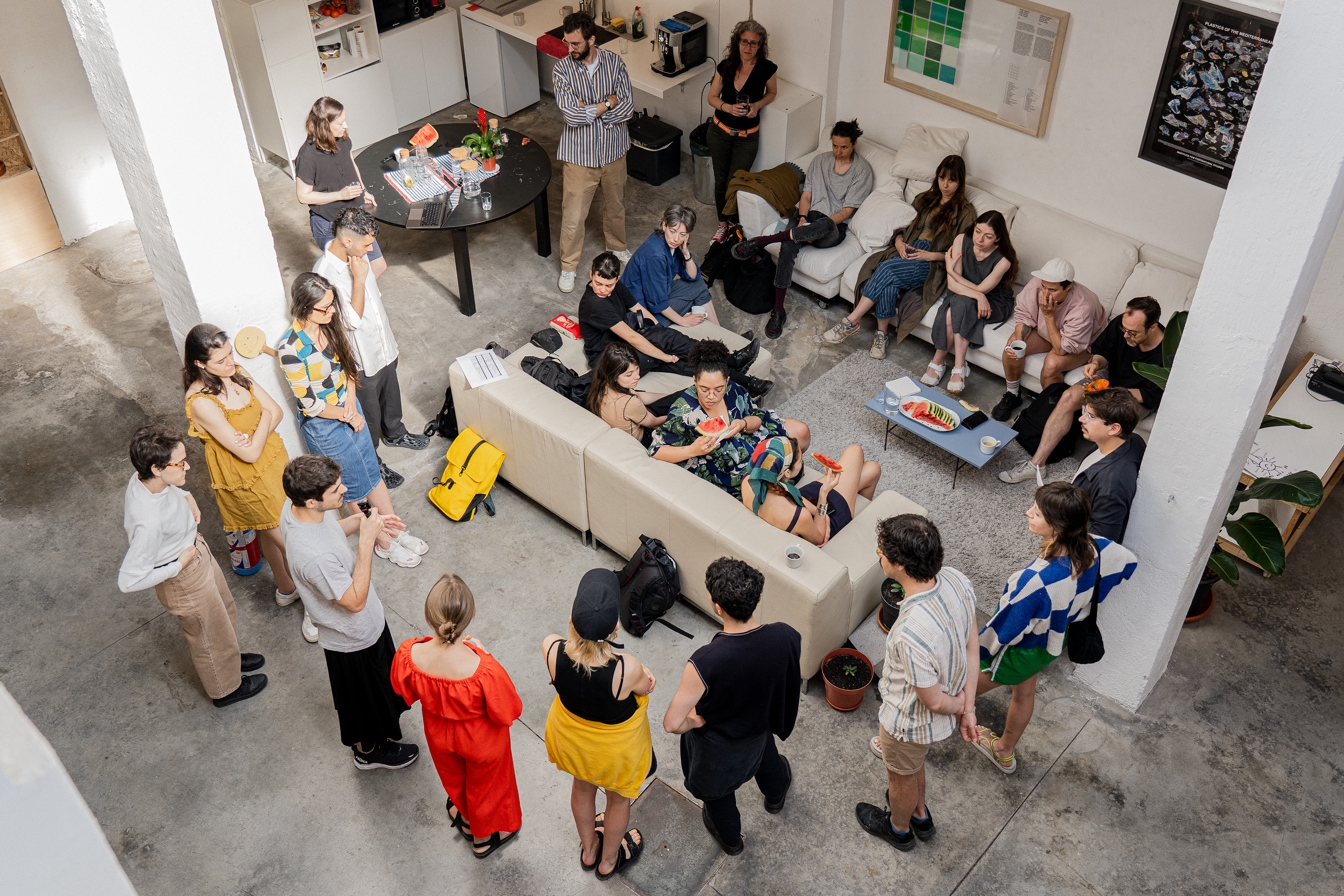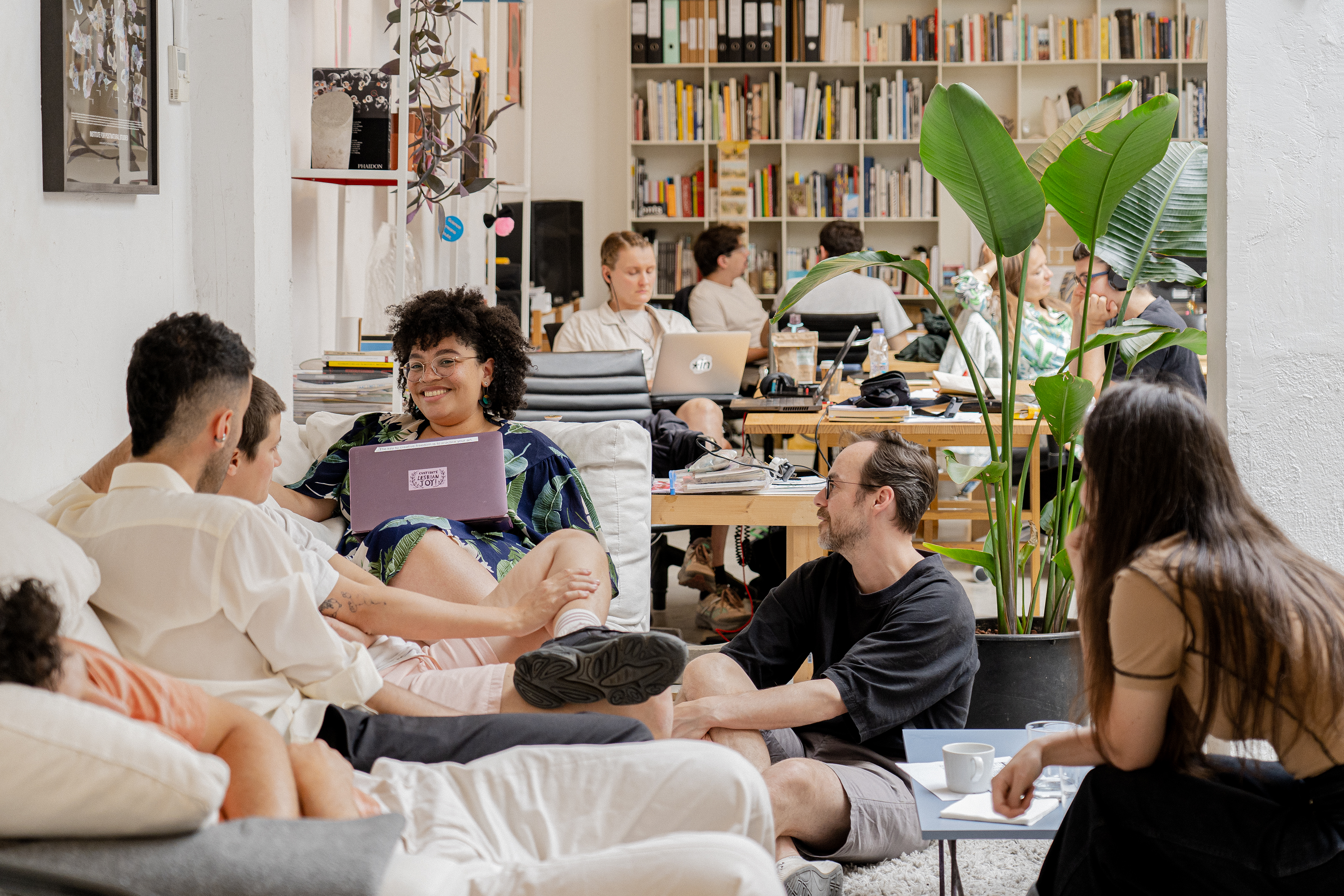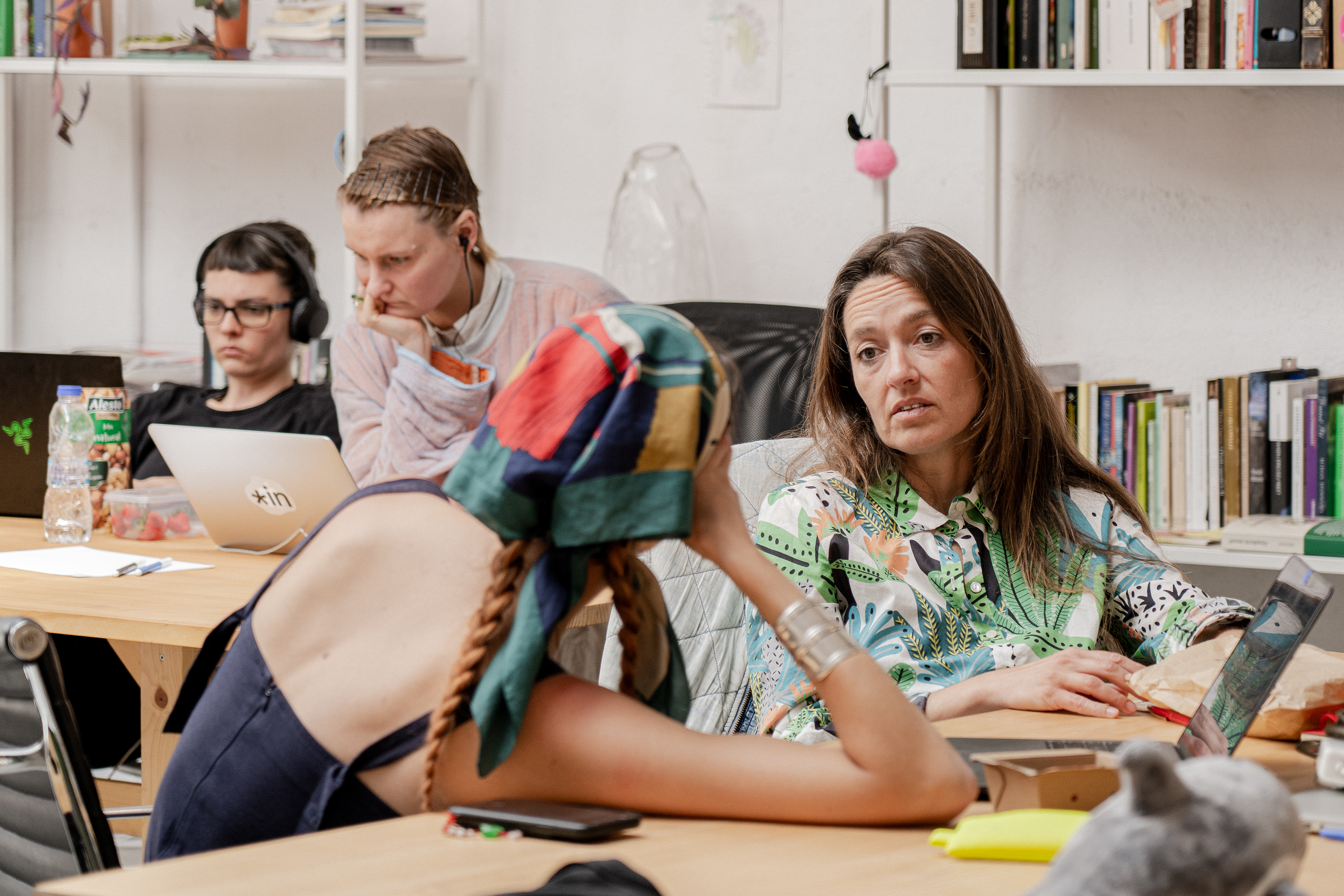PIP
2023
PIP 2023
Experimentation, mediation, dynamization, and facilitation are not only new tools from which horizontal learning platforms should emerge, but also the core and foundations from which to create safe and inclusive spaces that help rethink academia, and learning processes in general. It seems crucial at this point (in which various agents are exploring alternatives to the socioclimatic crisis) that such programs, which are fundamentally tied to the present, to cultural and geographical specificities, activate complex entanglements that not only examine the world but, by doing so, ultimately reshape it. The first Postnatural Independent Program (PIP) offered by the Institute for Postnatural Studies (IPS) was imagined as a new learning space that could offer theoretical tools and embodied knowledge to help define and develop ideas and projects that examine postnature as a framework for contemporary creation. Using a dual methodology incorporating both theory and practice, it emerged as an inclusive and horizontal virtual campus in constant shifting. Structured in 3 online modules, and accompanied by renowned international thinkers, artists, curators, and philosophers, it was complemented by two in-person encounters in Madrid; essential moments in which the participants (coming from many different countries and contexts) had the opportunity to share the embodied experience of being together in one physical space and time-zone. We believe that this complex and multilayered space that emerges from conversations, ideas, shared intimacies, vulnerabilities, and propositions has real consequences in the world. By critically leaving behind the representational distance between “us” and “them”, “here” and “there”, and “knowledge” and “superstition”, to name just a few of the dichotomies cultivated by Western traditional art and philosophy academies, we forge a necessary and immediate relation to the world. But who is “we”? And how can “we” stay together, despite our differences? How can “we” create collectivity without sameness, and bypass the pull towards homogeneity?
If something has happened during all these sessions together it is that the very structure of the program had to gradually absorb the doubts, anxieties, affiliations, affects, and interrogations that emerged from our conversations. Through long debates, roundabouts, contradictions, and other drifts, concepts, and ideas were constantly and elastically being shaped and reshaped. Like a sympoietic organism that grows and breathes together, the sense of collectively not-knowing became always the starting point to raise questions, that led, ultimately, to more questions; not a mise en abyme, but a productive attunement of different subjectivities and perspectives. The PIP has therefore become a tentacular structure embedded in a flexible time, operating from various geographies and temporalities; a new type of relationship between what we are, and a world that can begin to be; a transformation of the modes of being and sharing together that requires new thoughts and new rituals; a plurality that implies ways of thinking and acting in an affective political ecology. Worlding, the practice of enacting worlds to come, must start by rethinking who “we” are, why “we“ are (what “we“ are supposed to be), where “we“ come from, and what new subjectivities other worlds can bring with them. It is not arbitrary that one of the main words that have been problematic from the beginning is that of the “human” itself. To think about our surroundings and the environment is to rethink what being a human is today and how we can relate through care, awareness, love, and responsibility, and to find new modes to coexist symbiotically within the frictions of the future-present. Another cultural binomial comes into play when programming online learning: the physical and the “non-physical” experience, the material, and the “virtual”. Why might we feel that being connected online requires less presence? One of the things we have explored is the situatedness of our time spent together in different time zones and geographical locations. How does a person engage in a philosophical debate at 2 am, 6 pm, or 11 am? How can that be conceptualized as “virtual” or “nonphysical”? What role does the body play, when it is tired, rested, or just fed? In this sense, a kind of deep time emerges, both material and philosophical. From a contemporary ecological perspective, the cultural and the geological -the slow times of the earth-, but also the biological or the technological have totally different temporalities , but they are always intermingling, and intersecting. One important factor that brings much joy and empowerment is being able to connect to people and voices that speak from their locality, ultimately enriching the program and knowledge around the postnatural, which then becomes plural and even more heterogeneous. When trying to expand on traditional educational systems, we understood that our efforts should allow knowledge-sharing spaces that propel a horizontal approach that embraces (through care and mediation) the interconnectedness of the “classroom”. Knowledge is not only theoretical information, case studies, or data analysis. The PIP has organically become a space for emotional growth, for embodied experiences of joy, angst, and conflict, that alters the way we may relate between ourselves and our environments. We all have special needs when it comes to learning, and our individual physical, mental, and emotional abilities must play a central role. From the Insitute for Postntaural Studies, we have found ourselves constantly reflecting on many questions that could help propose new academic formats. How do we create a safe space that can hold and respect the individual and the collective simultaneously? What are the frontiers of personal infringement and how can these frontiers make us stronger as a necessarily heterogeneous group without harming anyone in the process? What happens when those perhaps conflictive needs clash or bounce or hybridize? One thing we have learned is that a safe space is not safe because it is free of harm or conflict, but because it is permanently open to enacting healing and reparation processes. PIP has been the beginning of an intellectual, embodied, collective, diffractive, emotional journey that brings us closer to the possibility of a world, or many worlds, where thinking together, not knowing, and building modes of affective affiliation become possible. For all this, we (members of IPS) want to deeply thank all the participants in the program, fellow travelers with whom we have had the beautiful opportunity of learning to unlearn.
If something has happened during all these sessions together it is that the very structure of the program had to gradually absorb the doubts, anxieties, affiliations, affects, and interrogations that emerged from our conversations. Through long debates, roundabouts, contradictions, and other drifts, concepts, and ideas were constantly and elastically being shaped and reshaped. Like a sympoietic organism that grows and breathes together, the sense of collectively not-knowing became always the starting point to raise questions, that led, ultimately, to more questions; not a mise en abyme, but a productive attunement of different subjectivities and perspectives. The PIP has therefore become a tentacular structure embedded in a flexible time, operating from various geographies and temporalities; a new type of relationship between what we are, and a world that can begin to be; a transformation of the modes of being and sharing together that requires new thoughts and new rituals; a plurality that implies ways of thinking and acting in an affective political ecology. Worlding, the practice of enacting worlds to come, must start by rethinking who “we” are, why “we“ are (what “we“ are supposed to be), where “we“ come from, and what new subjectivities other worlds can bring with them. It is not arbitrary that one of the main words that have been problematic from the beginning is that of the “human” itself. To think about our surroundings and the environment is to rethink what being a human is today and how we can relate through care, awareness, love, and responsibility, and to find new modes to coexist symbiotically within the frictions of the future-present. Another cultural binomial comes into play when programming online learning: the physical and the “non-physical” experience, the material, and the “virtual”. Why might we feel that being connected online requires less presence? One of the things we have explored is the situatedness of our time spent together in different time zones and geographical locations. How does a person engage in a philosophical debate at 2 am, 6 pm, or 11 am? How can that be conceptualized as “virtual” or “nonphysical”? What role does the body play, when it is tired, rested, or just fed? In this sense, a kind of deep time emerges, both material and philosophical. From a contemporary ecological perspective, the cultural and the geological -the slow times of the earth-, but also the biological or the technological have totally different temporalities , but they are always intermingling, and intersecting. One important factor that brings much joy and empowerment is being able to connect to people and voices that speak from their locality, ultimately enriching the program and knowledge around the postnatural, which then becomes plural and even more heterogeneous. When trying to expand on traditional educational systems, we understood that our efforts should allow knowledge-sharing spaces that propel a horizontal approach that embraces (through care and mediation) the interconnectedness of the “classroom”. Knowledge is not only theoretical information, case studies, or data analysis. The PIP has organically become a space for emotional growth, for embodied experiences of joy, angst, and conflict, that alters the way we may relate between ourselves and our environments. We all have special needs when it comes to learning, and our individual physical, mental, and emotional abilities must play a central role. From the Insitute for Postntaural Studies, we have found ourselves constantly reflecting on many questions that could help propose new academic formats. How do we create a safe space that can hold and respect the individual and the collective simultaneously? What are the frontiers of personal infringement and how can these frontiers make us stronger as a necessarily heterogeneous group without harming anyone in the process? What happens when those perhaps conflictive needs clash or bounce or hybridize? One thing we have learned is that a safe space is not safe because it is free of harm or conflict, but because it is permanently open to enacting healing and reparation processes. PIP has been the beginning of an intellectual, embodied, collective, diffractive, emotional journey that brings us closer to the possibility of a world, or many worlds, where thinking together, not knowing, and building modes of affective affiliation become possible. For all this, we (members of IPS) want to deeply thank all the participants in the program, fellow travelers with whom we have had the beautiful opportunity of learning to unlearn.










GUESTS
Karen Barad
Claire Colebrook
Lorenzo Sandoval
Stacy Alaimo
Cary Wolfe
Institute of Queer Ecology
Filipa Ramos
Gesyada Siregar
Paloma Lomas Contreras
Báyò Akómoláfé
Mary Maggic
Uriel Fogué
Claire Colebrook
Lorenzo Sandoval
Stacy Alaimo
Cary Wolfe
Institute of Queer Ecology
Filipa Ramos
Gesyada Siregar
Paloma Lomas Contreras
Báyò Akómoláfé
Mary Maggic
Uriel Fogué
PARTICIPANTS
Dominika Wasilewska
Aliaskar Abarkas
Adriana Gallo
Rosela del Bosque
Ama Josephine Budge Johnstone
Natália Trejbalová
Ana Roman
Lindertje Mans
Korallia Stergides
Diogo da Cruz
Maite Rodríguez
Noa Jansma
Hannah Hallam-Eames
Matheline Marmy
Caterina Gobbi
Madison Bycroft
Lisa Mazenauer
Sara Bonaventura
Davide Marcianesi
Lissy Willberg
Andrea Lumplecker
Kosmas Phan Dinh
Ania Mokrzycka
Caroline Ward
V for 5
Sai Di
Ishita Jain
Raju Rage
Sol Archer
Felix Bell
Aliaskar Abarkas
Adriana Gallo
Rosela del Bosque
Ama Josephine Budge Johnstone
Natália Trejbalová
Ana Roman
Lindertje Mans
Korallia Stergides
Diogo da Cruz
Maite Rodríguez
Noa Jansma
Hannah Hallam-Eames
Matheline Marmy
Caterina Gobbi
Madison Bycroft
Lisa Mazenauer
Sara Bonaventura
Davide Marcianesi
Lissy Willberg
Andrea Lumplecker
Kosmas Phan Dinh
Ania Mokrzycka
Caroline Ward
V for 5
Sai Di
Ishita Jain
Raju Rage
Sol Archer
Felix Bell
LINKS
we? BOOK
e-flux
Postnatural Independent Program (PIP): Modes of Border Dwelling
https://www.e-flux.com/education/features/549509/postnatural-independent-program-pip-modes-of-border-dwelling





